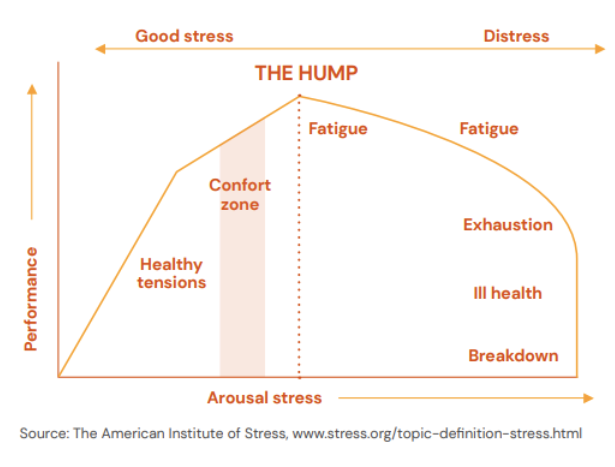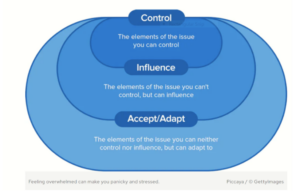At the end of this module, you will:
What is stress?
Stress is a part of life. It’s a normal human reaction that happens to everyone. In fact, our bodies are designed to experience stress and react to it. When you experience changes or challenges (stressors), your body produces physical and mental responses. That’s stress.
Stress can be experienced in different ways, so it’s helpful to understand the types of stress:
- Time Stress is about exactly that. You might think you’re not doing things at the right time or that you’ll run out of time to complete things.
- Anticipatory Stress is all about the future. You might be worried about an event such as an upcoming presentation or you have a general feeling that something will go wrong.
- Situational Stress is when you experience a situation that you believe you have no control over.
- Encounter Stress involves people. You might become anxious about interacting with just one person or a group of people. You may not like them or think they’ll judge, criticize or hurt you. It can also involve having too much contact with particular people.
What type of stress do you commonly experience?
Think about your life currently, or the last few times you felt stressed. Do you notice that the type of stress frequently falls into one of the above categories? Make not of that, because it can help when we get to managing stress.
While stress is usually a short-term experience and can even be helpful, by keeping us alert, motivated or ready to avoid danger, too much stress can take a heavy toll on our wellbeing. Also referred to as ‘distress’, this is the type of stress that is prolonged and/or severe, narrowing your ability to think clearly, function effectively, and enjoy life. Left unmanaged, distress and chronic stress can cause ill-health and disease, including; respiratory, blood pressure & heart problems, increased risk of stroke and type 2 diabetes, as well as mental health conditions like depression and anxiety.
The good news? There’s things you can do to keep your stress in check!
Is it common?
Everyone experiences stress in their life. But distress is also very common among people of all ages. In fact, one in six Australians experience high or very high levels of distress (source).Research shows that 72% of Australians feel stress impacts their physical health and 64% report it negatively affects their mental health. (source).
No matter what type of stress you’re experiencing it is important to know what to do about. When you have the skills to identify and manage the stress that you may experience, your overall wellbeing will benefit because you’ll be able to function better, work more productively, enjoy more positive relationships, and feel good about yourself. This module will provide tips and tools to help keep stress at bay.
What causes stress?
Stress is personal. What someone thinks is stressful, you might find satisfying and fun. For example, some people may find working ten hours a day for long periods does not cause them stress; for others, it will. Some people enjoy public speaking; for others, this can be stressful.
There are many things that can cause stress. Below are some common stressors:
Work Factors
- Being unhappy in your job
- Working long hours frequently
- Too much responsibility/ heavy workload
- Unclear expectations or lack of autonomy in role
- Risk of termination
- Facing discrimination or harassment at work
Life Factors
- Financial pressure or instability
- Chronic illness or injury
- Divorce
- Loss of a loved one
- Moving house/ state/ country
- Traumatic events such as natural disasters
Psychological Factors
- Uncertainty
- Unrealistic expectations
- Change
- Lack of self-esteem or confidence
Social Factors
- Poor access to services such as medical care, education, green spaces or transport
- Experiencing stigma or discrimination
What does stress feel like?
Stress has a thinking part and a feeling part. When stressed, you might have thoughts like “I can’t cope with this”, “this is too much pressure for me”, “I don’t have enough time” and “how am I going to get this done.” The impact of the source of stress exceeds the resources you have available to cope. In essence, your mind has decided you have ‘more on your plate than you can chew’ – this is the thinking part of stress.
Often occurring at the same time are physiological changes our bodies experience to try and manage acute stress. Sometimes this is referred to as the ‘Fight, Flight or Freeze’ response. Below are some examples of what this can feel like.

Signs your stress levels are unhealthy
We can often bounce back from acute stress, but exposure to ongoing or prolonged stress can be harmful to our wellbeing. It can actually narrow your ability to think clear, function effectively, and enjoy life. The below graph is a great example of how stress can tip into distress. The ‘comfort’ zone allows you to work under stressful conditions. Levels of arousal or stress passed the ‘comfort’ zone however, lead to impaired performance, reduced concentration, burn out, ill health and fatigue.

Some indicators that stress has turned into distress and become chronic are below:
- Aches and pains
- Insomnia or sleepiness
- A change in social behavior, such as staying in often
- Low energy
- Unfocused or cloudy thinking
- Change in appetite
- Increased alcohol or drug use
- Emotional withdrawal
ACTIVITY – Start a stress journal
A stress journal can help you identify the regular stressors in your life and the way you deal with them. Each time you feel stressed, keep track of it in your journal or on your phone. Keeping a daily log will enable you to see patterns and common themes. Write down:
- What caused your stress (make a guess if you’re unsure)
- How you felt, both physically and emotionally
- How you acted in response
- What you did to make yourself feel better
During your next session with your clinician, reflect and talk about the stressful event you recorded.
TIPS: Strategies for managing stress
While stress may be unavoidable in life, there are things we can do to manage its impact and prevent it from becoming chronic stress. A comprehensive approach to managing any type of stress you encounter includes action, emotion and adaptation based strategies.
| Action based strategies
Practical steps to reduce stress |
Emotion based strategies When stress is caused by our individual perception |
Adaptation based strategies
When you have little or no control over the situation |
| Identify what is causing you stress and understand how much stress you’re under. A stress scale might help with this. | Use cognitive restructuring to see a stressful event or interaction from a different perspective and flush out biased information or assumptions, by challenging the evidence. | Adjust your standards. Perfectionism is a major source of avoidable stress. Set reasonable standards and SMART goals for yourself and others, and learn to be okay with “good enough.” |
| Keep a stress journal to better track stressors, your response and management of this. | Use the ABC model to shift your focus and become more optimistic. | Reframe problems. Try to view stressful situations from a more positive perspective. |
| Pare down your to-do list. Analyze your schedule, responsibilities, and daily tasks. If you’ve got too much on your plate, drop tasks that aren’t truly necessary to the bottom of the list or eliminate them entirely. | Focus on self-affirming behaviours such as using affirmations to prevent stress taking control. Affirmations are positive statements written in present tense that are the opposite of your usual self sabotaging thinking patterns. | Use breathwork such as diaphragmatic breathing, mindful breathing or heart-focused breathing. |
| Say “no.” Know your limits and stick to them. Whether in your personal or professional life, taking on more than you can handle is a surefire recipe for stress. Distinguish between the “shoulds” and the “musts” and, when possible, say “no” to taking on too much. | Download phone apps that focus on stress reduction exercises such as Smiling Mind, Headspace and Calm. YouTube also offers a range of relaxing videos that help to reduce stress. | Ensure you get enough restful sleep each night, eat nutritious foods and exercise regularly. Good physical health contributes to your capacity to tolerate stress. |
| Take control of your environment. If the evening news makes you anxious, turn off the TV. If traffic makes you tense, take a longer but less-travelled route. If going to the market is an unpleasant chore, do your grocery shopping online. | Express your feelings instead of bottling them up. If something or someone is bothering you, be more assertive and communicate your concerns in an open and respectful way. | Become creative and think outside the box. Reflect upon the stressful situation and list ways you could approach it differently. Could you learn a new skill? Change your role? Take on different responsibilities? |
| Chat to someone about how you are feeling, and consider joining a support group online or in person. |
Activity: Try a strategy
Use one of the strategies listed next time you feel stressed. Make record of how it went ad discuss with your clinician. If you can’t find a strategy that works for you in the above list, chat to your clinician so you can work together to develop one.
TIPS: Be the CIA when it comes to stress
A quick way to assess and manage stress is by using the CIA model developed by Neil and Sue Thompson (2008). Next time a stressful situation occurs, use this model to identify the circumstances facing you as being fully within your control, having some influence rather than full control, or having no control requiring acceptance or adaptation. This can help you develop a quick plan to reduce stress.

Key Takeaways
Resources and Further Reading
- Stress scale to identify causes and level of stress: www.mindtools.com/avn893g/the-holmes-and-rahe-stress-scale
- Stress journal template: www.mindtools.com/ag3ueu7/stress-diaries
- Stress reduction apps such as Smiling Mind, Headspace and Calm
- ABC model and template to shift mindset: www.stresscourse.tripod.com/id97.html
- Heart-focused breathing: https://youtu.be/JxNjw3bcfVo
If you would like to know more about stress, below are some recommended articles and videos. Some of these may be quite technical, so if you have any questions, be sure to write them down and bring them to your next session.
| Burnout and how to complete the stress cycle Podcast with Brene Brown, Emily Nagoski and Amelia Nagoski. |
| Learned Optimism; How to change your mind and your life
2006. Martin Seligman. |
| Stress Management Tips by HelpGuide. |
| Stress and the General Adaptation Syndrome.
1950. Selye, H. British Medical Journal. |
| The Critically Reflective Practitioner.
2008. Thompson, S. and Thompson, N. |
